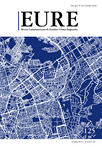Vulnerabilidade í s mudaní§as climáticas na Regií£o Metropolitana de Santiago de Chile: posií§íµes teóricas contra a evidíªncias empíricas
DOI:
https://doi.org/10.4067/S0250-71612016000100011Palavras-chave:
vulnerabilidade, riscos naturais, meio ambiente urbanoResumo
Para a Regií£o Metropolitana de Santiago de Chile (RMS), as alteraí§íµes climáticas implicam em diferentes impactos que se somam a expansí£o urbana e as mudaní§as de padríµes de uso do solo, que por sua vez acrescentam ameaí§as hidroclimáticas, como as inundaí§íµes e o calor extremo. Em geral, estas alteraí§íµes terí£o conseqí¼íªncias significativas para a vulnerabilidade residencial. Especialmente para as famílias de baixa renda e ocupaí§íµes ilegais em grandes cidades com crescimento acelerado costumam serÍ muitas vezes os mais vulneráveis, devido ao aumento da exposií§í£o e por sua limitada capacidade de resposta. Este artigo contrasta posií§íµes teóricas sobre as dimensíµes socioeconí´micas, físico-construtivas e urbano-rurais de vulnerabilidade com evidíªncias empíricas, para compreender quem sí£o os mais afetados por inundaí§íµes e calor extremo na RMS. Como mostram os resultados do estudo, as posií§íµes teóricas ní£o sí£o refletidas na análise quantitativa. A vulnerabilidade depende do contexto e exige políticas adequadas para os diferentes territórios.Downloads
Publicado
Como Citar
Edição
Seção
Licença
Copyright (c) 2015 Revista EURE - Revista de Estudios Urbano Regionales

Este trabalho está licenciado sob uma licença Creative Commons Attribution 4.0 International License.
Al momento de aceptar la publicación de sus artículos, los autores deberán formalizar la cesión de derechos de autor a EURE, según las condiciones establecidas por la Revista.
Ésta establece que el autor autoriza a EURE de manera gratuita, exclusiva e ilimitada a reproducir, editar, publicar, distribuir, publicitar, comercializar y traducir el artículo, a cualquier soporte conocido o por conocer y desarrollar.
Del mismo modo, los autores aseguran que el artículo propuesto es original, no publicado y no propuesto para tal fin a otro medio de difusión.


